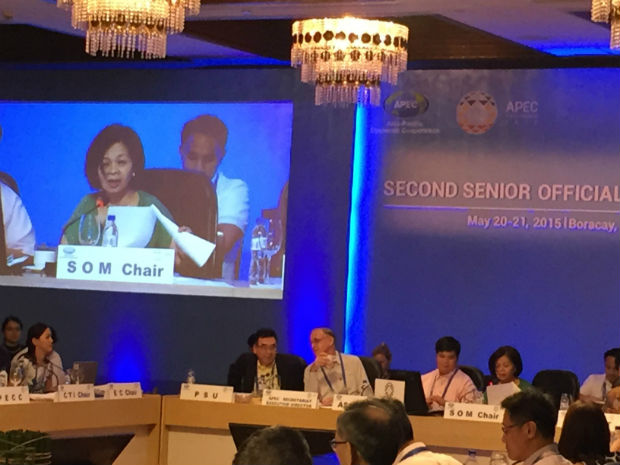
BORACAY, Aklan – The second leg of the Senior Officials Meeting (SOM) for the Asia Pacific Economic Cooperation (APEC) summit here started off with tales of how Boracay got its name and evolved into the country’s premier summer destination.
In her opening remarks at the SOM II in Boracay Shangri-La Hotel Wednesday, Foreign Affairs Undersecretary for international economic relations Laura del Rosario shared the origins of Boracay, which she said is loosely translated as darling (“Acay”) bubbles (“Bora”) in the local language.
She told the delegates of the story of businessman Lamberto Tirol and his wife Sofia who settled on the island and started its development in the harvest of coconuts and tobacco.
“There are different stories on how Boracay got its name but I’d like to tell you of the one of an enterprising couple named Lamberto and Sofia regarded as pioneers of the island. This couple, the Tirol couple, are known to have started planting coconuts and purchased tobacco. They are also credited with naming the island,” Del Rosario, a former ambassador, said.
“When they came to the island, it was still nameless. But one day, Lamberto was looking seaward and he noticed the foam and froth that formed as the waves hit the white sand on the sea shore,” Del Rosario said.
“In the local language, he called up to his wife and said ‘Acay, hanggod ka bora.’ Bora in the local language means bubbles and Acay is a term of endearment which means darling. One of the natives overheard the conversation and the name Boracay was later referred to this whole island, named ‘Darling bubble,’” Del Rosario said.
Del Rosario said the Tirols were said to be the island’s first business persons who started the development of the island from harvesting coconuts and tobacco to entertaining tourists with its white sand beaches.
“More than the island’s name, the couple’s decision to settle on the island to stimulate development started a chain of events that would change the landscape of the island… It diversified from farming to other added activities and gradually turned to tourism,” she said.
Planning policies
Del Rosario said the senior officials of APEC will meet Wednesday and Thursday with the intention of planning policies and programs for inclusive economic growth that will be felt even among the ordinary people or “masa” (masses).
“Here, we tackle issues which have a direct contribution on the lives of the ordinary people… We see economic growth through the lens of inclusiveness… and promote areas of cooperation not only in trade and business, but also on issues which affect the very fabric of the man on the street,” Del Rosario said.
She reiterated the need for small and medium enterprises (SMEs) to participate in the global market, and for children to be educated with the skills necessary for them to adapt to the changing technological landscape, as well as the importance of technology to uplift people from poverty.
“My fellow officials, we work with the future in mind (for) inclusive growth through different initiatives and programs… I hope Boracay is a good backdrop on what APEC wants to achieve and secure in the future, for the earth, sea, and sky are one,” Del Rosario said.
“We hope you find time enjoy what this island has to offer and realize that it is indeed more fun in the Philippines,” she added.
APEC priorities
The second senior officials meetings from May 20 to 21 aims to bring together delegates for updates on previous commitments, as well as introduce additional measures to achieve the following APEC priorities – regional economic integration, SME’s participation in regional and global markets, investment in human resource development, and sustainable and resilient communities.
The meetings are preceded with 37 technical working group meetings on a variety of topics, such as oceans and fisheries, food security, science and technology, higher education, human resource development, emergency preparedness, internet economy and connectivity, counterterrorism, and tourism, among others.
Senior officials will then report to trade ministers during the Ministers Responsible for Trade meetings on May 23 to 24 also here in Boracay.
The Philippines is hosting this year’s APEC, a delegation of 21 member economies. The country hosted APEC ahead of the Asean integration in 2015. It hosted the APEC leaders’ meeting for the first time in 1996.

